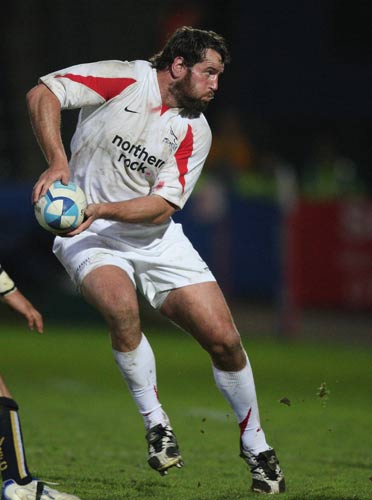Peter Bills: Premiership faces cull in harsh financial times

There is, according to a well placed source close, a “better than 50/50 chance” that the English Rugby Premiership will have two clubs less by the start of next season.
Bristol and Newcastle are said to be the likely casualties of these increasingly harsh financial times. Bristol are thought to need a major cash injection of up to £1.5m a season into the club. In times such as these, finding someone with that sort of spare cash is about as likely as unearthing the odd gold bar when you’re digging up your Christmas sprouts in the back garden allotment.
Newcastle are in similarly serious financial difficulty. They have already unloaded high wage earners like England internationals Toby Flood and Matthew Tait, saving themselves hundreds of thousands in the process. Now there is talk of New Zealander Carl Hayman, the highest wage earner in the entire English Premiership at £350,000 a year (Worcester’s Australian full-back Chris Latham runs him close in the earning stakes at £325,000 a year), returning home a year before his contract is due to expire.
Furthermore, the club’s ground has been bought from its owners Northern Rock (aka HM Government), by the University of Northumbria and Newcastle’s future is uncertain, especially as the club is not exactly rushing to renew the contracts of those players whose deals expire next summer. For them, there is worrying uncertainty.
Owner Dave Thompson has wanted out for some time but has been unable to find someone willing to take it on. If only the club’s original professional backer, Sir John Hall, had listened to real rugby men who knew all along that Newcastle would never sustain a successful professional rugby club on a long term basis. The place is, always has been and always will be soccer daft. Rugby is a strictly minority interest sport. But it has taken millions of wasted pounds for a succession of owners to discover what knowledgeable rugby folk could have told them all along.
The truth is, financial reality is starting to bite in English rugby, just as it is everywhere else. But one considerable chink of light in the growing darkness is the contract the English Premiership clubs’ have negotiated with a combination of Sky and Setanta for a three year deal which will start in September 2010.
The contract represents a 40 per cent increase on the previous one, which was solely with Sky. The arrival of Setanta, a growing force in the TV sports market and an impressive one too, has enhanced the value of the deal considerably.
However, between the end of 2008 and September 2010, expect a lot more financial pain to become apparent in English Premiership rugby. Bath are said to be likely to lose around £350,000 this season, which is light years away from the idea of their owner Andrew Brownsword, who prefers not to have to put any of his own money out on the rugby club.
The only solution to this contraction of finance is a shrinking of the Premiership, and that will suit those clubs that do survive because they will get a bigger, juicier share of the financial pot if there are two less clubs in existence.
And there is another irony likely to arise from this situation. Growing concerns over finance are forcing those old warring factions, the RFU and PRL, the English clubs’ body, to come together and discuss deals of mutual financial interest. “It’s quite extraordinary” said my source, “but the game could come out of this financial crisis better and with greater cohesion than it ever enjoyed in the years of prosperity.”
Ironic indeed….
But there might be another scenario some financially pressed clubs may need to look at in the near future: amalgamations or takeovers. Sale, for example, look vulnerable now that Phillipe Saint-Andre has announced he is quitting next May. Star players like New Zealand centre Luke McAlister and Frenchman Sebastien Chabal may also leave, especially if the club is keen to cut its costs, which means reducing a sizeable wage bill.
The overall feeling among the Premiership clubs is that only those with deep financial pockets will and indeed deserve to survive. “If a club’s finances are not soundly based, things must take their natural course” one Premiership Director told me, with an icy chill to his voice.
In other words, the survival of the fittest…………
Join our commenting forum
Join thought-provoking conversations, follow other Independent readers and see their replies
Comments
Bookmark popover
Removed from bookmarks